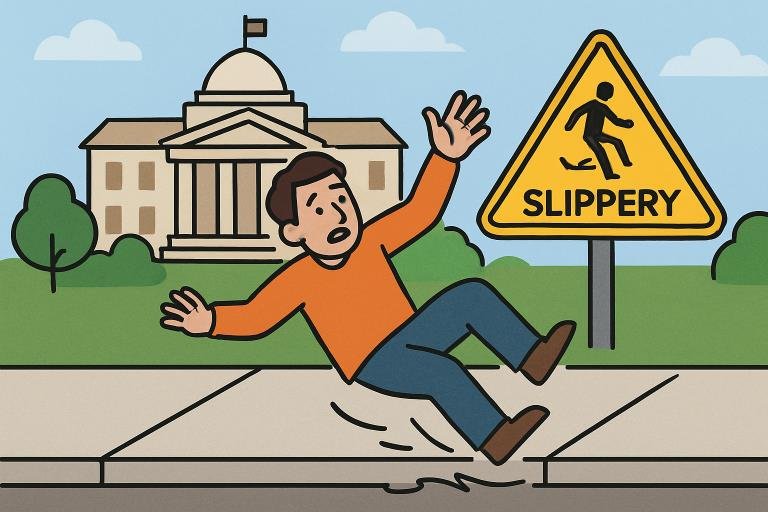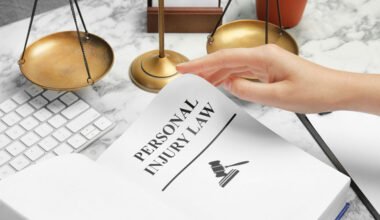Key Takeaways
- Seek immediate medical attention to thoroughly document all injuries, even minor ones.
- Report the slip and fall incident to the responsible public authority without delay.
- Gather evidence from the scene to support your version of events.
- Recognize that claims against government bodies have strict procedures and shorter deadlines.
- Work with a specialist attorney for guidance throughout your claim.
Slip and fall accidents on public property can leave you with injuries, stress, and lots of questions about what to do next. Many people are unsure how to navigate this complex process, especially since the regulations governing government-owned spaces differ from those for other premises liability claims. If you’ve experienced slipping on public property, it’s critical to act quickly and understand your legal options so you can protect your health and your right to compensation.
Minor injuries can worsen over time, so acting quickly after an incident is crucial for a strong claim. Your actions and documentation immediately after a fall can greatly impact your case, whether on a city sidewalk, in a government building, or at a park. Follow these steps to handle the situation confidently.
Filing a claim involves strict rules and deadlines that vary by location. Missing a step can mean losing your chance for compensation. It’s important to understand the process and consult an experienced attorney.
Your priority should be your health and keeping detailed records of the accident and injuries. Proper documentation, prompt reporting, and understanding municipal liability are key to avoiding a dismissed case and securing a successful claim.
Immediate Medical Attention
Your well-being comes first after a slip and fall. Some injuries, like head trauma or soft-tissue damage, may not manifest immediately, but prompt evaluation by medical professionals ensures your injuries are properly identified and documented. Immediate medical attention not only gets you the care you need but also produces a medical record that will be crucial as evidence later in your claim.
According to the Centers for Disease Control and Prevention (CDC), millions of people are treated for fall injuries each year, highlighting the importance of timely medical assessment, even when injuries initially seem minor.
Reporting the Incident
Notifying the correct public authority is essential and should be done promptly. If you fall in a government building, notify the facility supervisor or security personnel and request an incident report. For accidents in outdoor public spaces, such as city parks or sidewalks, report the hazard to the municipal department responsible for maintenance. Be diligent about obtaining copies of any written reports made, which can strengthen your account of the incident.
Gathering Evidence
Immediate evidence collection is crucial, especially on government property, to quickly remediate hazardous conditions. Take clear photos or videos of the fall area, document injuries and damaged property, and gather contact information from witnesses. Keep copies of official reports, organize medical records, and maintain a personal timeline that details the injury’s impact on work, mobility, and family life. Gather contact information from witnesses, keep copies of official reports, and organize medical records.
Understanding Legal Procedures
Claims involving public property face legal hurdles, like filing a notice of claim—sometimes called a Government Tort Claim—within a narrow window after the accident. In California, this is six months, but varies by state. Missing this step disqualifies your case, regardless of its merits. Legal resources detail strict deadlines and notices when suing government entities. Include supporting documents when you file, and clearly explain what happened and how negligence by the public entity contributed. Consulting an attorney early maximizes your chances of meeting all requirements.
Consulting an Attorney
An attorney with experience in personal injury claims involving municipal or state agencies can dramatically affect your case outcome. Public entity claims involve unique issues, including governmental immunity and complex liability rules. An experienced slip and fall attorneys will identify and comply with the necessary procedural steps, accurately value your damages, and negotiate or litigate on your behalf if needed. Many attorneys offer free consultations, so reach out before critical evidence disappears or a deadline passes.
Conclusion
Pursuing a slip and fall claim on public property is a complex journey that requires diligence from the outset. With immediate medical attention, thorough evidence collection, prompt incident reporting, and an understanding of legal procedures, you put yourself in the best possible position to receive appropriate compensation. When in doubt, consult an experienced attorney to help you navigate the maze of deadlines and paperwork so you can focus on your recovery while protecting your rights.



